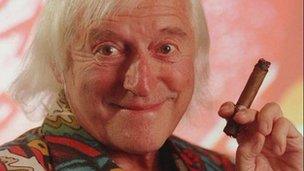Jimmy Savile: Prosecutors to re-examine abuse allegations
- Published

Director of Public Prosecutions Keir Starmer is to review decisions by the Crown Prosecution Service not to prosecute Jimmy Savile in 2009.
The CPS had looked at four sexual abuse claims against the late TV presenter and DJ, all dating back to the 70s.
Mr Starmer said he would also consider how the CPS could refer cases to other agencies when charges were dropped.
The NSPCC said it had received 161 calls about allegations against Savile and had passed details to police.
The charity said it had also received 105 contacts, unrelated to the Savile case, from adults about abuse they suffered when children.
In other developments:
- BBC Trust chairman Lord Patten has sought to reaffirm the corporation's independence from government in a letter to the culture secretary
- Mark Thompson - the BBC director general when a Newsnight programme into Savile was shelved in December - has told the New York Times he Ex-BBC boss denies Savile role
- The National Association for People Abused in Childhood says it has received 2,500 calls to its helpline since the Savile scandal began.
- The Daily Telegraph, which says the BBC "appears guilty, at the least, of wilful ignorance", and the Independent, which says a Panorama programme about the scandal has "started to restore some trust", are among newspapers that have reacted to the latest developments
'Obvious problems'
The Met Police has launched an investigation into the star - who died last year aged 84 - and says more than 200 potential victims have been identified.
The CPS has said charges were not brought over a file covering four possible cases of abuse against Savile - submitted by Surrey Police in 2009 - because the alleged victims' unwillingness to support police inquiries made a conviction unlikely.
Director of public prosecutions (DPP) Mr Starmer, whose principal legal adviser Alison Levitt QC will conduct a review into those cases, said in a statement there were "obvious problems" in proceeding in such cases.
This was particularly true where there was no forensic evidence "and only very limited, or even in some instances no, witness evidence, particularly in relation to allegations which date back a number of years", he added.
He said the decision not to prosecute was being re-examined "out of an abundance of caution".
And he said he would be discussing with the attorney general whether the CPS "should adopt a policy of referring cases to other relevant agencies, such as social services, where an allegation is made but cannot be proceeded with for evidential reasons".
Shadow attorney general Emily Thornberry welcomed the DPP's decision but said "any review should be independent of the CPS in order to command public confidence".
'Serious questions'
Speaking at Prime Minister's Questions, Mr Cameron said: "The Director of Public Prosecutions specifically is going to consider what more can be done to alert relevant authorities where there are concerns that a prosecution is not taken forward.
"The government will do everything it can do, other institutions must do what they can do, to make sure that we learn the lesson of this and it can never happen again."
He said the allegations "and what seems to have happened are completely appalling and, I think, are shocking the entire country.
"These allegations do leave many institutions, perhaps particularly the BBC, with serious questions to answer - I think, above all, how did he get away with this for so long?"
David Cameron: Director of Public Prosecutions will review decision not to prosecute Jimmy Savile
The BBC has launched two independent inquiries related to Savile - one into whether there were any failings in the management of the Newsnight investigation, and one into the culture and practices of the BBC during his time there.
"It's very important that the BBC makes clear these inquiries can go where the evidence leads, they'll have access to all the paperwork and they will be able to be truly independent and get to the truth on behalf of all the victims of Jimmy Savile," Mr Cameron told MPs.
In a third review launched by the BBC, an expert will look at sexual harassment claims and practices at the corporation.
Meanwhile, the BBC's editorial policy and standards director David Jordan has said that a controversial blog post written by Newsnight editor Peter Rippon about the dropped investigation was not "signed off" by senior staff.
In the 2 October blog post - later described by the corporation as "inaccurate or incomplete" in some respects - Mr Rippon said the story would have been stronger if it could have shown institutional failings, which it had failed to do.
"We know that [BBC head of news programmes] Steve Mitchell was consulted about the blog, or rather it was shown to him, but he doesn't sign it off in any sense," Mr Jordan told BBC Radio 4's Media Show.
He said the editor of a programme was "expected to know what's in the investigation he has commissioned or wants to run".
"So there's nothing unusual about that, it's very straightforward, you ask the editor to account for it, the editor accounts for it.
"Unfortunately, on this occasion some mistakes were made in the way in which he accounted for it."
Conservative MP Ann Main has tabled a Commons motion calling for the Leveson Inquiry into press phone hacking to be extended to scrutinise the BBC.